Overview
The article identifies ten critical environmental issues that Title Research Directors must address, including the impacts of land use changes, contamination risks, and the implications of climate change on property values and compliance. Understanding these issues is essential for making informed decisions and promoting sustainable land management practices. Furthermore, this understanding enhances compliance with environmental regulations and protects property values.
Introduction
The intersection of environmental concerns and land services has become increasingly critical as the real estate landscape evolves. Title Research Directors encounter a multitude of challenges, from navigating complex regulations to grasping the ecological implications of land use changes. This article explores ten key environmental issues that are reshaping title research, providing insights on how professionals can leverage technology and sustainable practices to enhance compliance and protect property values.
How can Directors effectively tackle these pressing environmental challenges while ensuring informed decision-making in an ever-changing regulatory environment?
Parse AI: Streamlining Title Research for Environmental Compliance
Parse AI harnesses advanced machine learning and optical character recognition (OCR) technologies to streamline the title research process. This innovation is crucial, as accurate title research is foundational to compliance in real estate. By quickly gathering essential details from extensive documentation, Parse AI empowers Directors to enhance compliance effectively. Furthermore, this technological advancement not only accelerates the research timeline but also minimizes the risk of errors associated with manual data entry, resulting in more precise assessments of property titles for compliance.
According to Gartner, businesses adopting automation technologies like OCR can expect to see a 40-60% improvement in operational efficiency within two years of implementation. This statistic underscores the in the real estate sector, compelling organizations to consider the integration of such solutions.
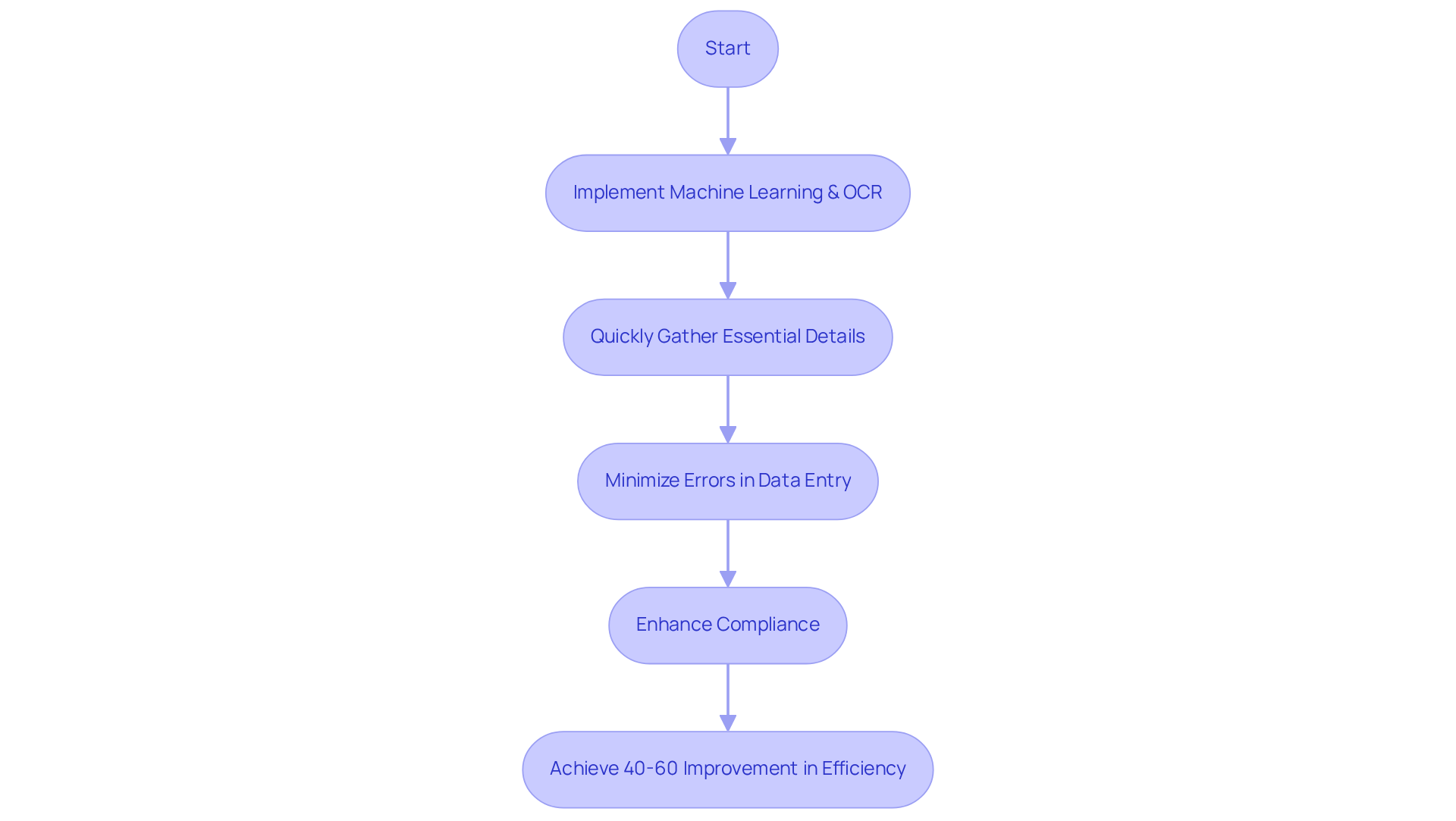
Impact of Land Use Changes on Ecosystems
Land use changes, including urbanization and agricultural expansion, profoundly affect ecosystems by altering habitats, diminishing biodiversity, and disrupting ecological processes. Title Research Directors must recognize these impacts related to environmental issues in land services when assessing properties, as they can significantly influence property values and compliance with environmental regulations. Understanding these dynamics is essential for making informed decisions that support .
Sustainable Land Management Practices
Sustainable soil management practices, such as crop rotation, agroforestry, and conservation tillage, are essential for enhancing productivity and preserving ecosystems. These methods not only improve soil health but also mitigate risks related to degradation and contamination. For instance, studies indicate that implementing crop rotation can lead to significant increases in crop yields, with some farmers reporting up to a 25% boost in productivity when integrating perennials like alfalfa into their systems. Furthermore, conservation tillage practices have been linked to improved soil structure and reduced erosion, which are critical for maintaining long-term agricultural viability.
Research directors should advocate for these sustainable practices in their assessments, as they contribute to addressing environmental issues in land services and compliance with regulations. By promoting effective resource use strategies, they can support the long-term ecological health of the regions they serve. The integration of not only enhances productivity but also fosters resilience against climate variability, making it a crucial consideration for land assessments. As ecological specialists emphasize, adopting such practices is vital for addressing environmental issues in land services, which is essential for achieving food security and sustaining agricultural livelihoods amidst ongoing ecological challenges.
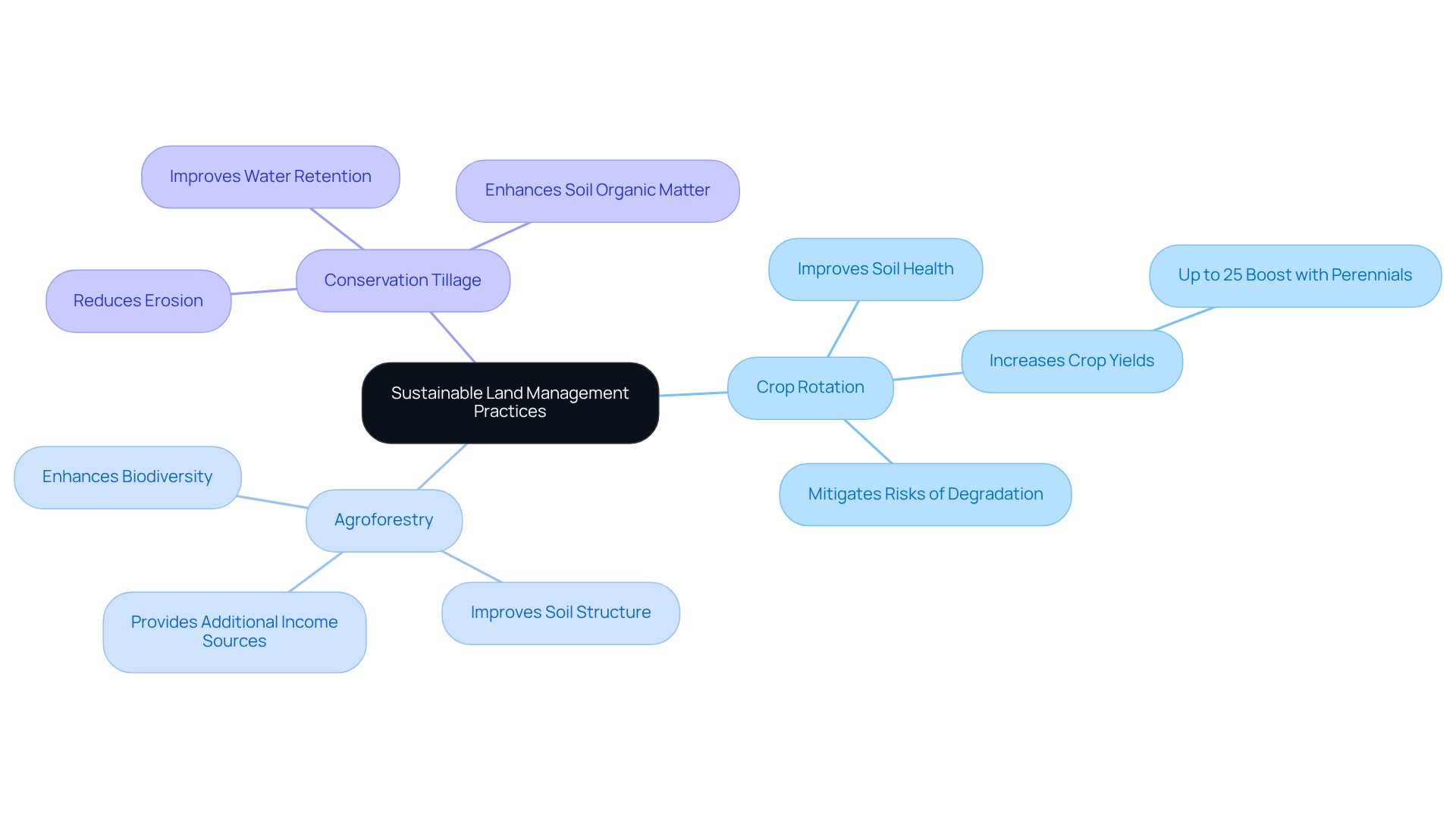
Understanding Environmental Regulations and Standards
Research Directors must possess a comprehensive understanding of regulations and standards related to nature, including the National Environmental Policy Act (NEPA) and the Clean Water Act (CWA). These regulations dictate land use and ecological protection, highlighting environmental issues in land services and necessitating thorough assessments of potential impacts prior to property transactions.
Compliance with the CWA is essential, as it sets forth requirements that can significantly influence title research processes. Legal specialists highlight that adhering to these frameworks not only mitigates risks linked to ecological liabilities but also enhances the credibility of title research results.
Furthermore, data indicates that states frequently implement more rigorous regulations than federal guidelines, reflecting local ecological priorities. This regulatory framework underscores the importance of incorporating compliance with ecological standards into title research, particularly addressing environmental issues in land services, ensuring that all transactions are executed within the bounds of legal obligations.
By aligning documentation practices with these standards, Directors can shield their organizations from potential liabilities and help mitigate environmental issues in land services while contributing to sustainable land development.
To further enhance compliance, Regulatory Directors should routinely and collaborate with legal specialists to stay abreast of evolving ecological standards.
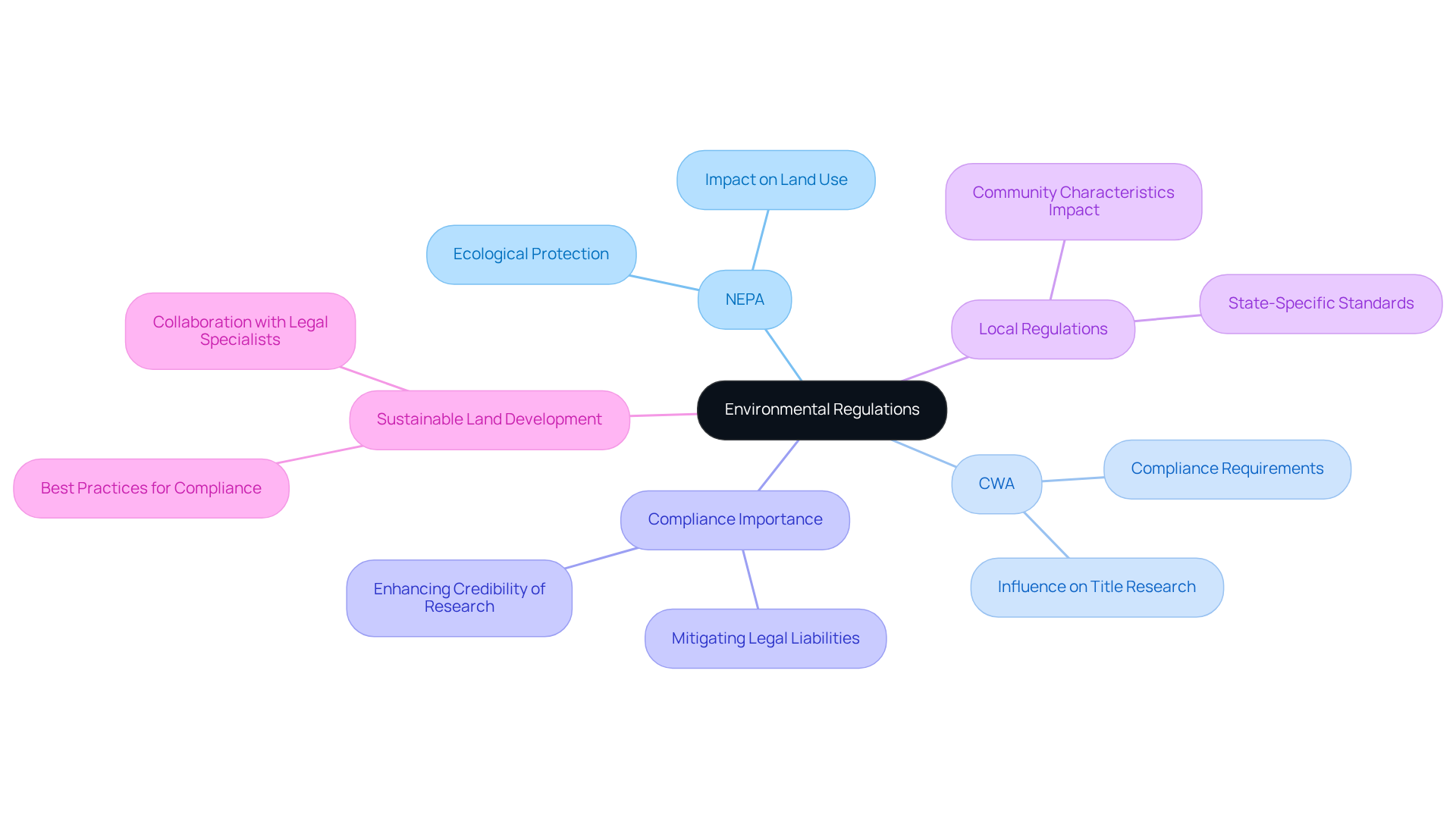
Risks Related to Contamination in Land Services
Contamination risks from hazardous waste locations and industrial activities present significant challenges for leaders in title management, highlighting the environmental issues in land services, often resulting in considerable remediation expenses and legal responsibilities if overlooked. In 2025, the importance of conducting comprehensive ecological due diligence, especially in relation to environmental issues in land services through Phase I Site Assessments (ESAs), cannot be overstated. These assessments are vital for identifying potential environmental issues in land services before they escalate into costly problems.
Research indicates that residing near toxic waste sites can lead to serious health issues, including cancer and developmental disabilities, complicating remediation efforts further. By proactively addressing these risks, Title Research Directors not only protect property values but also ensure compliance with evolving ecological regulations concerning environmental issues in land services.
As one ecological consultant noted, "A comprehensive Phase I ESA is the first line of defense against unforeseen liabilities, providing invaluable insights into a property's ecological history." This proactive approach is essential in today's landscape, where the can be substantial.
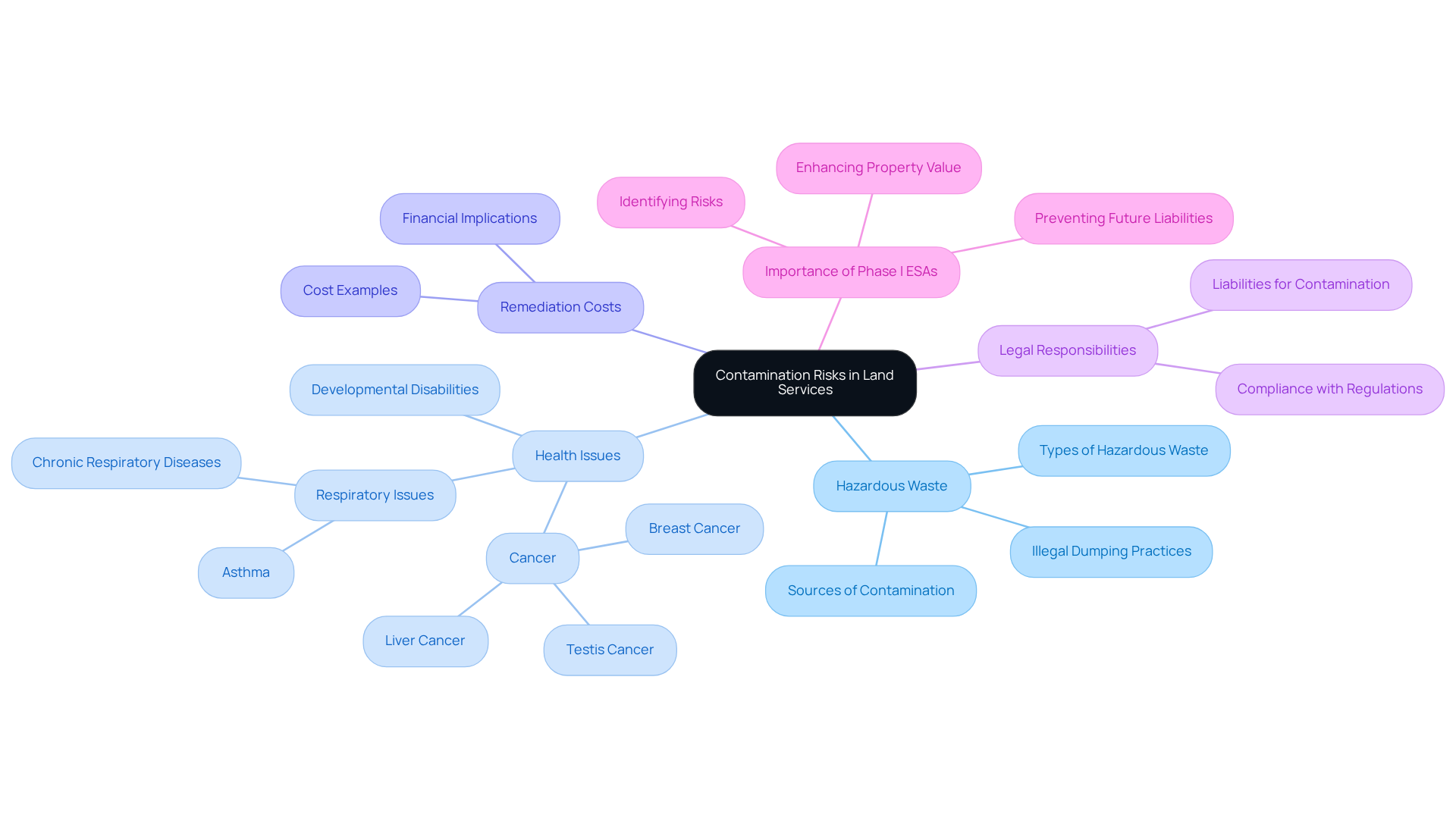
Role of Environmental Indicators in Land Use Assessment
Environmental indicators, particularly biodiversity indices and soil health metrics, are pivotal in assessing the sustainability of land use practices. These indicators empower Directors of Examination to scrutinize the of proposed developments, thereby ensuring adherence to ecological standards. Biodiversity indices, for instance, offer valuable insights into ecosystem health, reflecting species diversity and their interrelations within habitats. Meanwhile, soil health metrics assess critical factors such as organic matter content, nutrient availability, and soil structure—elements essential for agricultural productivity and ecological resilience.
Integrating these ecological indicators into evaluations enables Title Research Directors to make informed decisions that not only comply with regulations but also promote sustainable resource use. Successful applications of biodiversity indices in title research have proven effective in pinpointing areas of ecological significance, steering development away from sensitive habitats. For example, Latvia's high agri-environmental sustainability value, resulting from effective conservation practices, underscores the importance of biodiversity indices in land use planning, particularly in regions confronting urbanization and agricultural intensification.
Furthermore, the challenges faced by Estonia concerning pesticide use and greenhouse gas emissions underscore the necessity of these indicators in tackling environmental issues. By employing these tools, Project Evaluation Directors can enhance their assessments, facilitating the conservation of natural resources and the promotion of sustainable development in their initiatives.
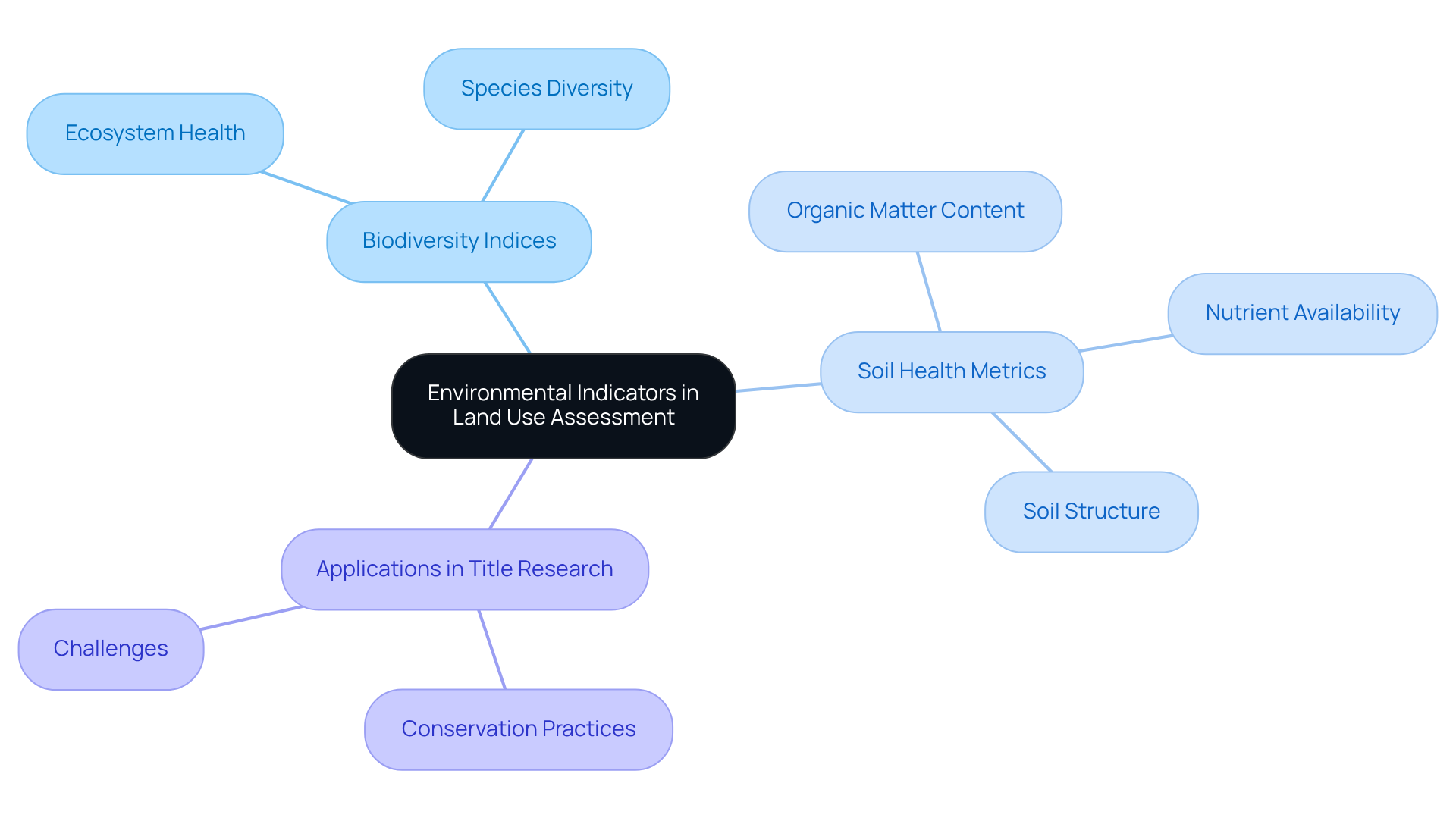
Interpreting Legal Language in Property Titles
Navigating the intricate legal terminology in property documents is essential for Directors of Title Studies. The specificity of terms such as 'easements,' 'encumbrances,' and 'restrictive covenants' can significantly impact property rights and obligations. Real estate firms must ensure adherence to local laws and regulations during transactions, making a comprehensive understanding of these terms crucial for conducting thorough title research. Misinterpretations of easements can lead to costly legal challenges, underscoring the financial implications of title issues. protects against hidden liens and debts from previous owners.
By refining their expertise in legal terminology, Document Analysts can improve the precision of their evaluations and promote smoother transactions, ultimately protecting their clients' interests. As legal expert Micah Riley states, "Understanding the nuances of easements and encumbrances is vital for preventing disputes and ensuring a successful closing.
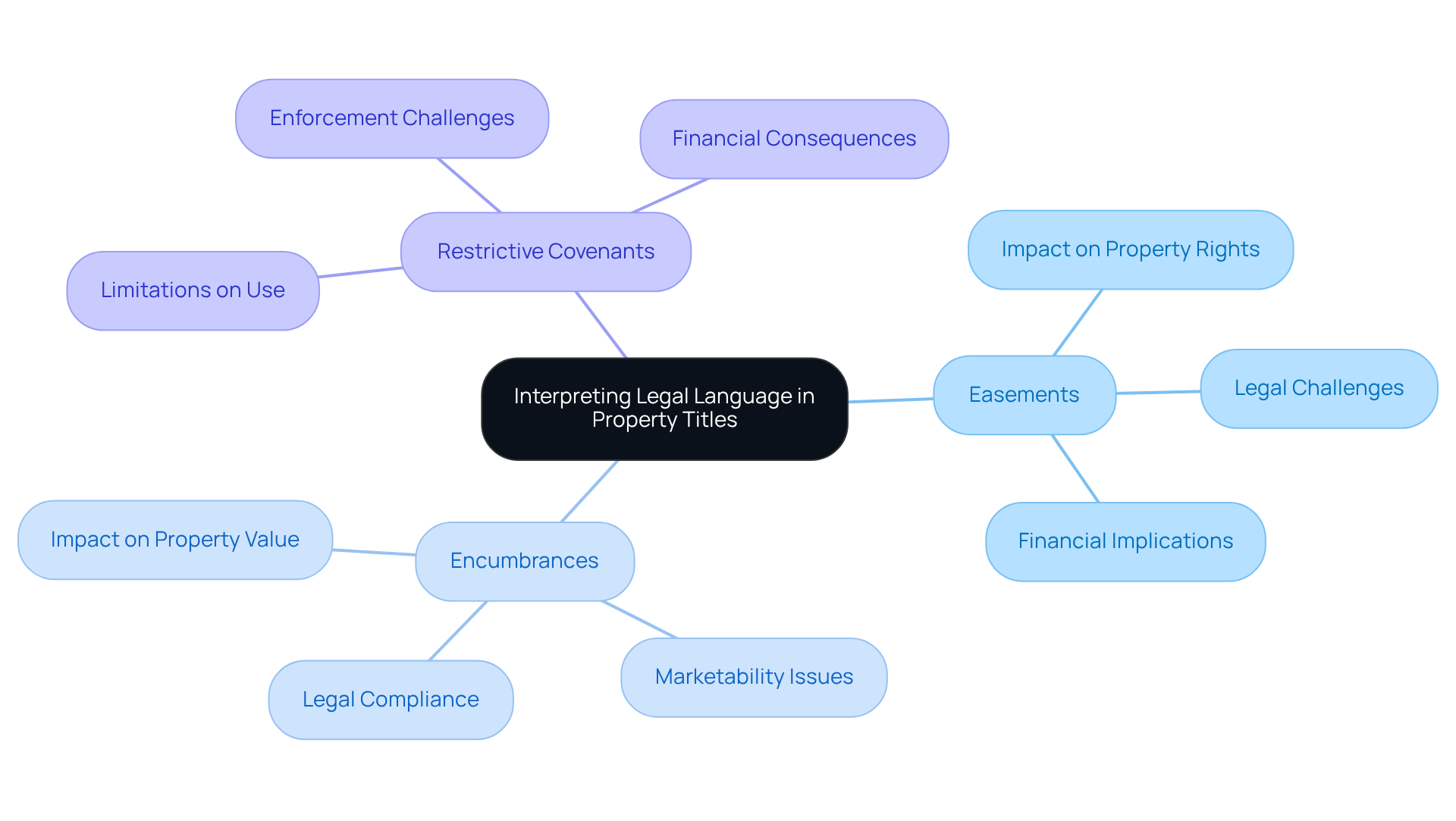
Community Engagement in Land Use Planning
Community involvement is pivotal in resource use planning, ensuring that local voices are integral to decision-making processes. Title Engagement Directors must advocate for that actively engage stakeholders in discussions regarding usage changes. Research indicates that municipalities with heightened civic engagement often achieve improved alignment between usage choices and community values, fostering sustainable development and enhancing public trust in the planning process.
For example, mayors across various municipalities have unanimously acknowledged that civic participation is vital for effective land-use planning; notably, two-thirds of mayors categorically rejected the notion of entirely eliminating civic participation from the planning process. This consensus underscores the critical importance of stakeholder involvement.
However, it is important to note that some municipalities reported low participation levels, with only a handful of individuals engaged. Successful instances of stakeholder involvement illustrate that when diverse community perspectives are integrated, planning outcomes more accurately reflect the needs and aspirations of local residents.
As Miroslav Kopáček asserts, 'Civic participation is a crucial aspect of democracy,' underscoring its essential role in shaping effective use policies. By prioritizing these inclusive strategies, Directors of Studies can cultivate a more democratic and effective planning process, ultimately resulting in more resilient and responsive policies for spatial usage.
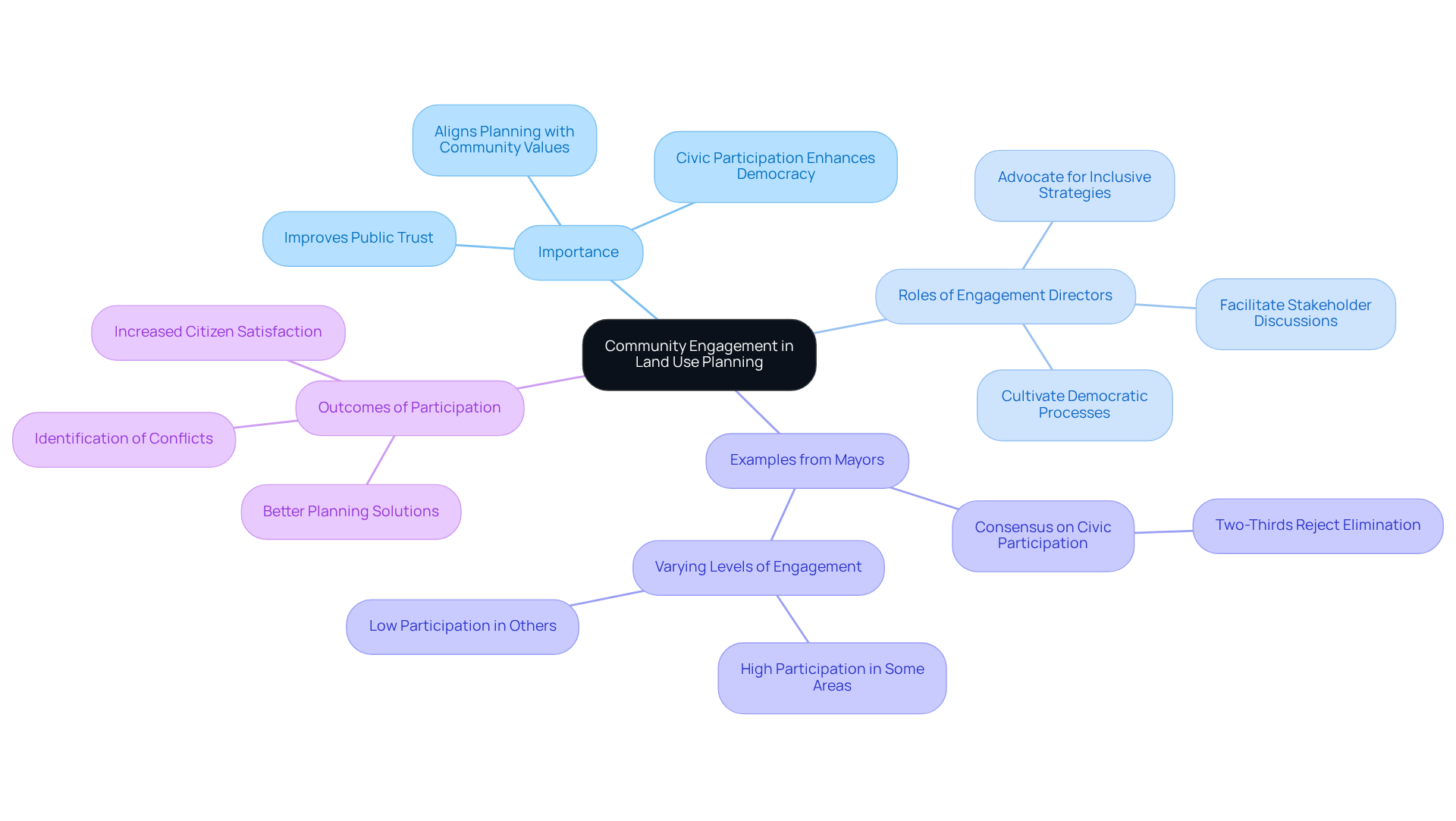
Climate Change Implications for Land Services
Climate change presents significant environmental issues in land services, including increased flooding, droughts, and evolving land use patterns. Climate Assessment Directors must acknowledge that these climate-related risks can significantly impact property values and highlight the importance of addressing environmental issues in land services. Projections indicate that climate change could lead to a staggering $1.47 trillion in net across the U.S. by 2055, driven by rising insurance costs and shifting consumer demand. Furthermore, a projected 29.4% increase in average insurance premiums underscores the financial implications of climate change on property values.
By incorporating climate change considerations into their title research processes, Title Research Directors can enhance their assessments of properties, effectively addressing environmental issues in land services and ensuring they are equipped to navigate future challenges. This proactive approach n
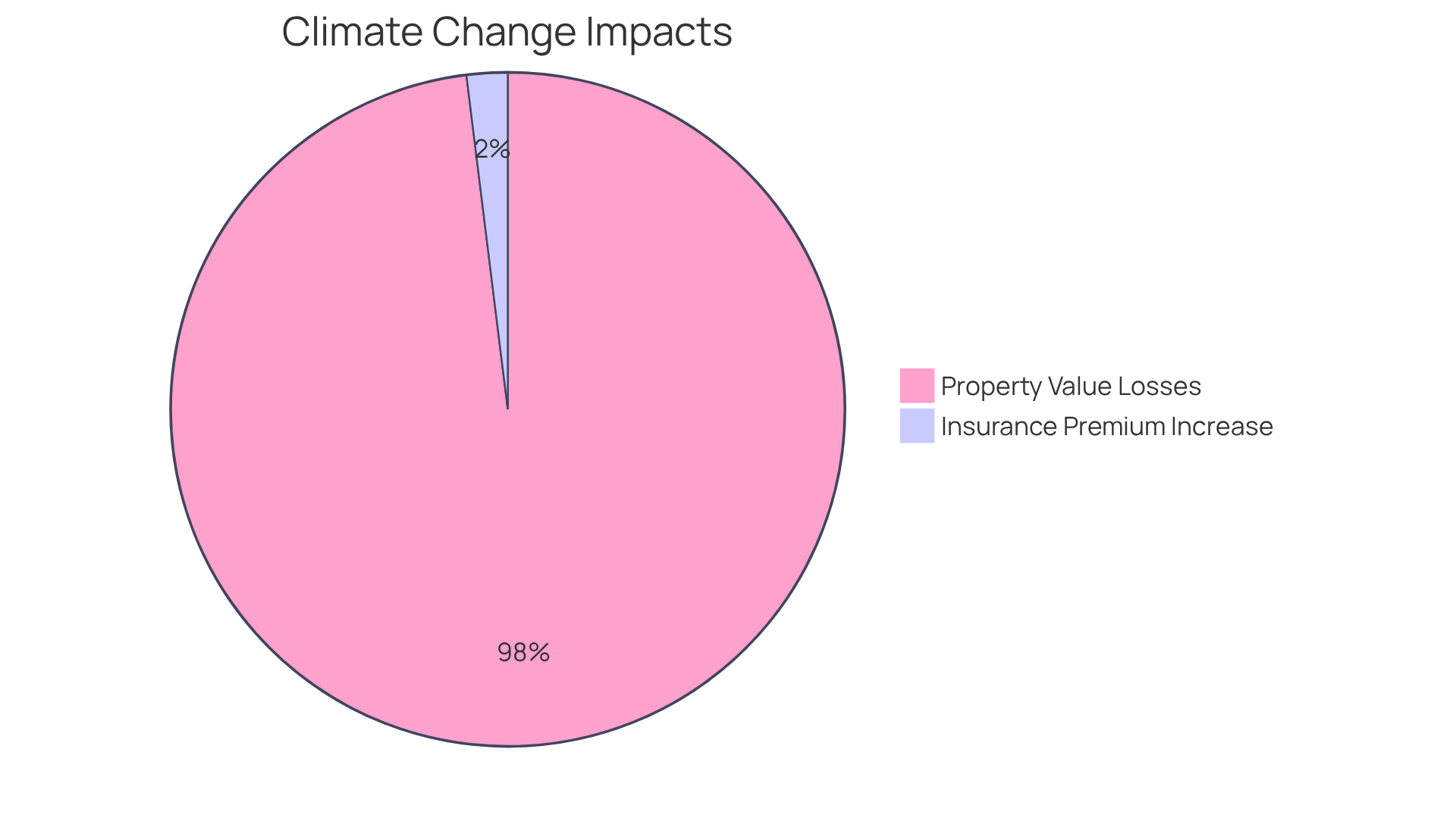
Ongoing Education in Environmental Issues for Real Estate Professionals
Continuous learning about ecological matters is crucial for real estate experts, particularly Property Investigation Directors. As regulations and best practices evolve, it is imperative to stay informed about the latest developments in environmental science and policy. Engaging in workshops, webinars, and certification programs not only enhances knowledge but also equips Title Directors to navigate the complexities of title analysis effectively.
Research shows that Realtors who invest in education often achieve higher incomes; notably, 36% of those with bachelor's degrees earn between $35,000 and $100,000, while 18% surpass the $100,000 mark. This data underscores the value of in enhancing professional capabilities and positively impacting the industry.
As President Ronald Reagan aptly stated, "Preservation of our environment is not a liberal or conservative challenge; it's common sense," highlighting the necessity for informed professionals in the field. By prioritizing continuous education, professionals can ensure their practices align with current environmental standards and effectively tackle environmental issues in land services while contributing to sustainable land management.
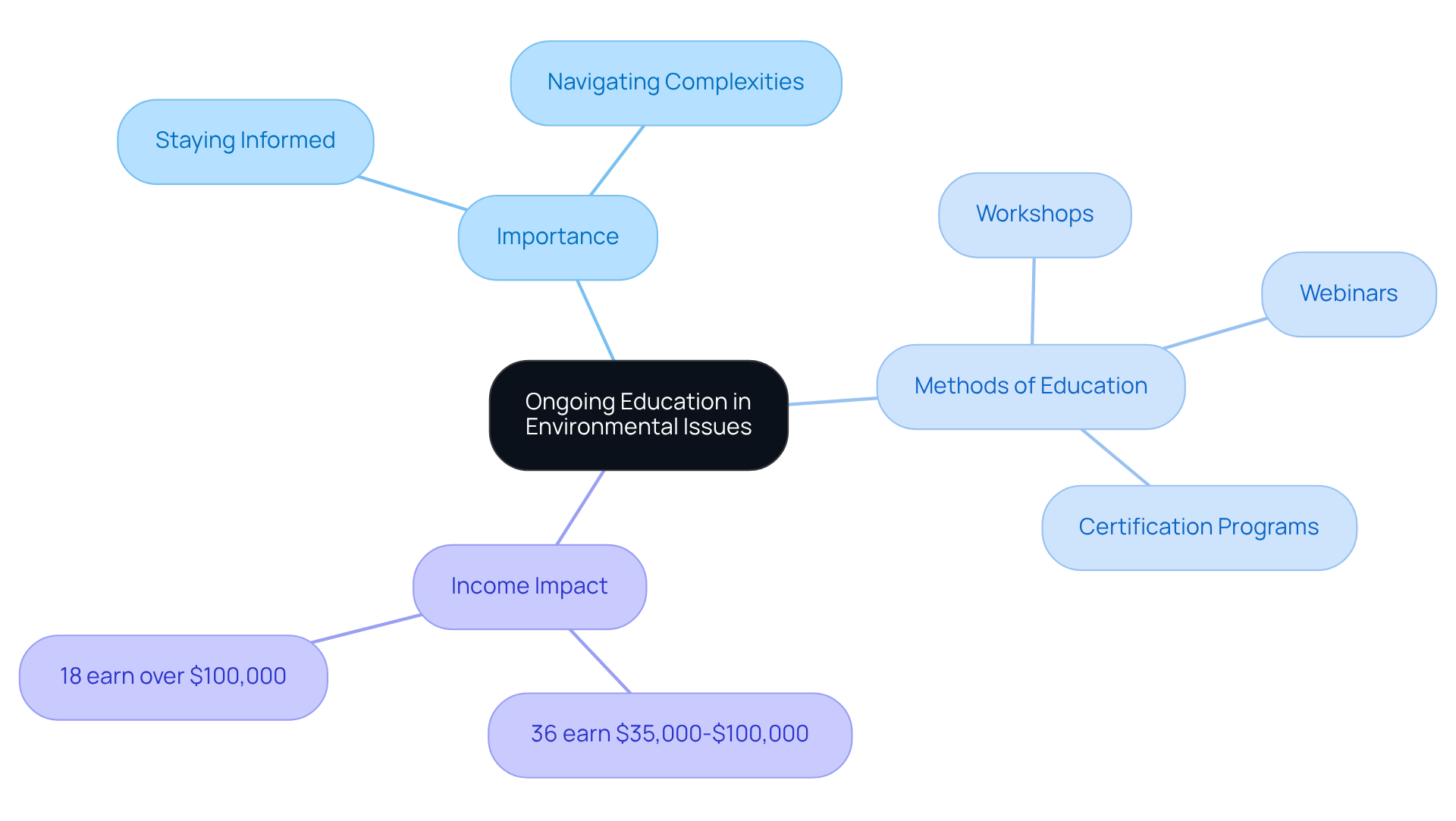
Conclusion
Understanding environmental issues in land services is crucial for Title Research Directors, as it directly impacts compliance, property values, and sustainable development practices. The integration of advanced technologies such as Parse AI not only streamlines title research but also enhances accuracy and efficiency in environmental compliance. This technological shift underscores the necessity for real estate professionals to adapt to evolving practices that prioritize ecological considerations.
Key arguments discussed throughout the article highlight:
- The significant impacts of land use changes on ecosystems.
- The importance of sustainable land management practices.
- The necessity of understanding environmental regulations.
Furthermore, the risks associated with contamination and the role of environmental indicators in land use assessment emphasize the multifaceted nature of these challenges. The need for community engagement and ongoing education reinforces the idea that collaboration and knowledge are vital in effectively addressing these environmental issues.
Ultimately, the call to action is clear: Title Research Directors and real estate professionals must prioritize ecological awareness and continuous learning to navigate the complexities of land services in a changing environment. By doing so, they not only protect property values and ensure compliance with regulations but also contribute to the sustainable management of resources, fostering a healthier ecosystem for future generations. Embracing these practices is not merely a professional obligation; it is a commitment to the well-being of the communities and environments they serve.
Frequently Asked Questions
What is Parse AI and how does it benefit title research in environmental compliance?
Parse AI utilizes advanced machine learning and optical character recognition (OCR) technologies to streamline the title research process, which is essential for compliance in real estate. It quickly gathers important details from extensive documentation, helping Directors enhance compliance effectively, while also reducing errors associated with manual data entry.
What improvement in operational efficiency can businesses expect from adopting automation technologies like OCR?
According to Gartner, businesses that adopt automation technologies such as OCR can anticipate a 40-60% improvement in operational efficiency within two years of implementation.
How do land use changes impact ecosystems?
Land use changes, such as urbanization and agricultural expansion, significantly alter habitats, reduce biodiversity, and disrupt ecological processes. These impacts are crucial for Title Research Directors to consider when assessing properties, as they can affect property values and compliance with environmental regulations.
What are some sustainable land management practices?
Sustainable land management practices include crop rotation, agroforestry, and conservation tillage. These methods enhance soil health, increase productivity, and mitigate risks related to degradation and contamination.
How does crop rotation affect agricultural productivity?
Studies indicate that implementing crop rotation can lead to significant increases in crop yields, with some farmers reporting up to a 25% boost in productivity by integrating perennials like alfalfa into their systems.
Why is conservation tillage important for agriculture?
Conservation tillage practices improve soil structure and reduce erosion, which are critical for maintaining long-term agricultural viability.
How can research directors support sustainable practices in land assessments?
Research directors should advocate for sustainable soil management practices in their assessments, as these practices help address environmental issues in land services and comply with regulations, ultimately supporting the ecological health of the regions they serve.




